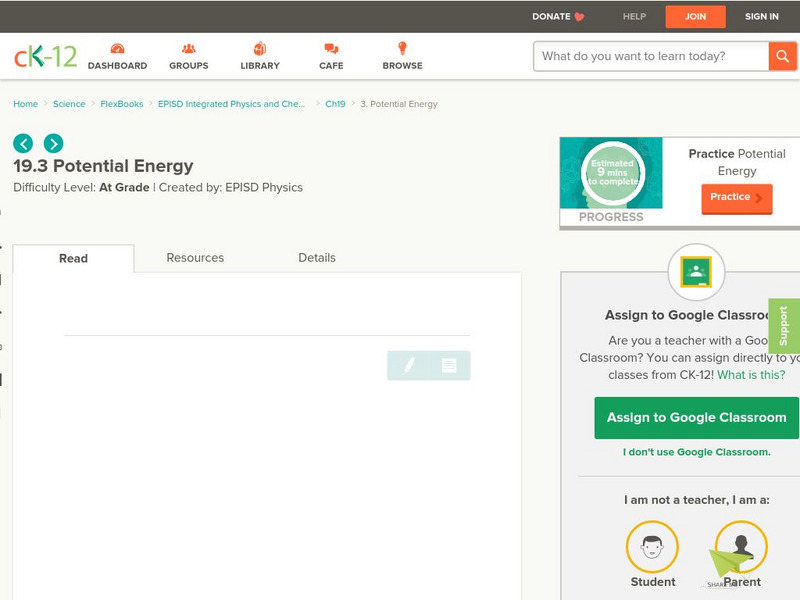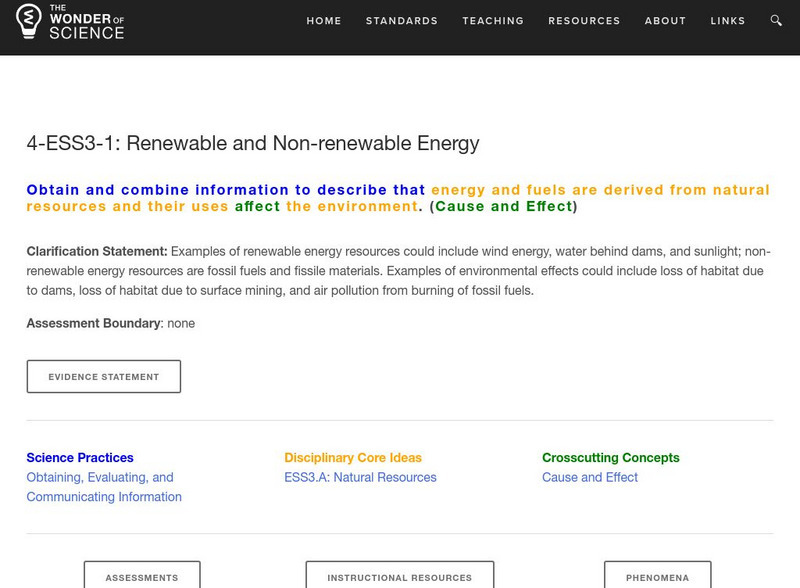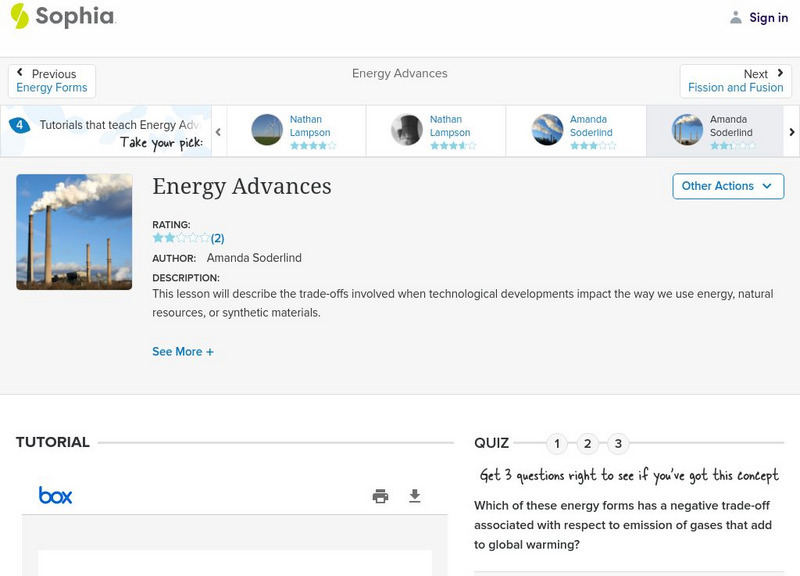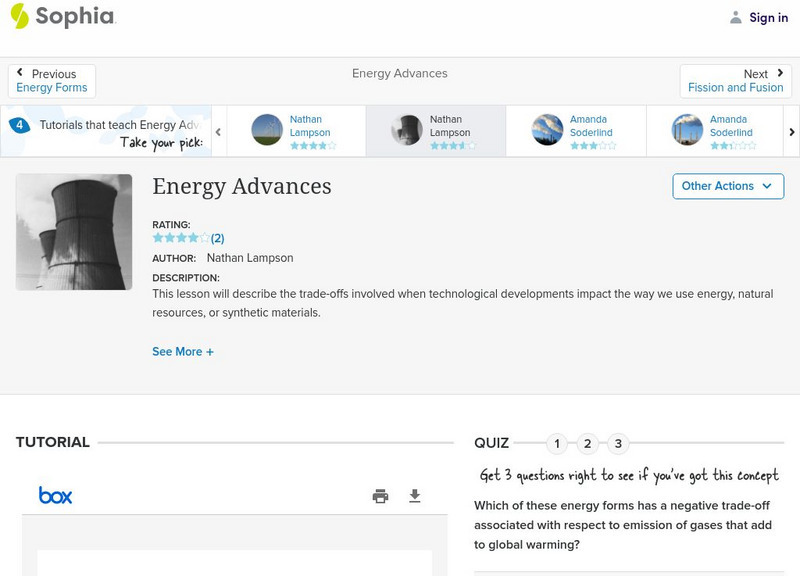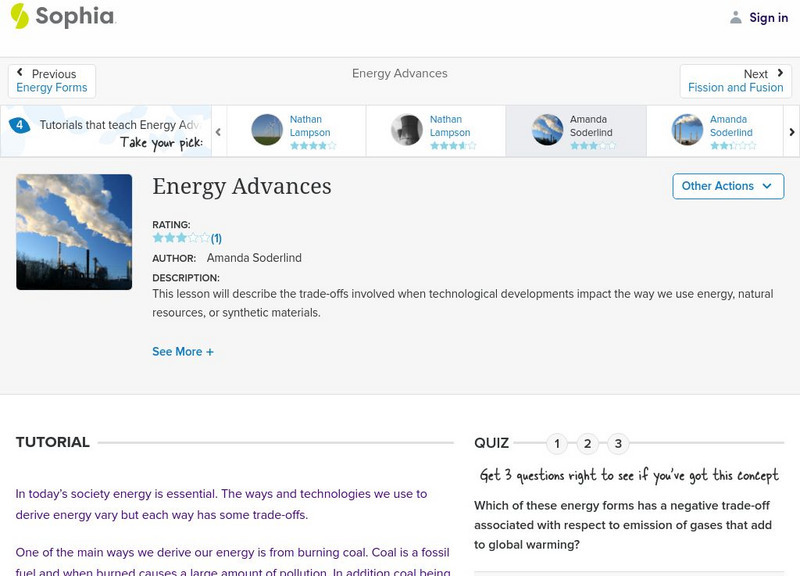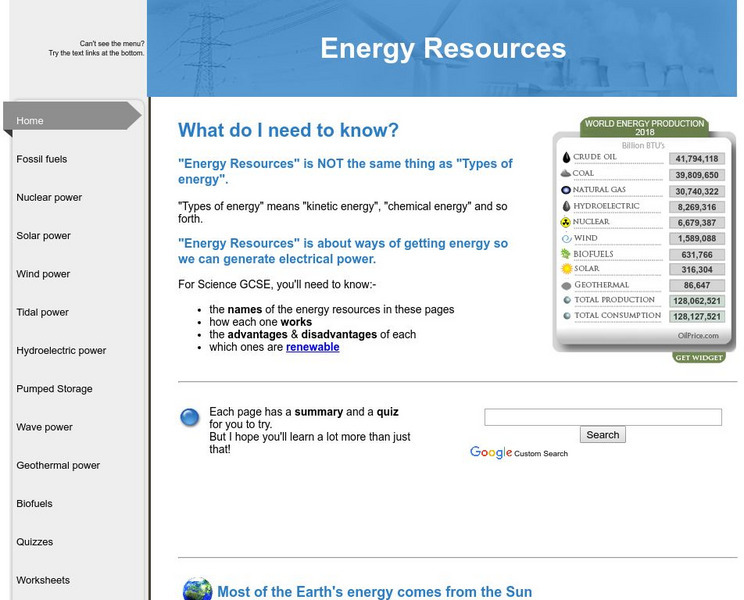National Academies of Sciences, Engineering, and Medicine
The National Academies: Our Energy Sources
The many sources of energy production in the United States are described in this overview. Included are traditional sources, renewable sources, and new energy production technologies.
US Energy Information Administration
U.s. Eia Energy Kids: Energy Sources: Renewable
Find out what renewable energy is and the role it plays in meeting energy needs. Renewable energy sources include biomass, hydropower, geothermal, wind, and solar.
Other
Alliance to Save Energy: A Home Energy Audit
This activity allows students to become building inspectors, identifying features that can help or hurt energy conservation.
Texas Education Agency
Texas Gateway: Ready for an Energy Makeover?
Sometimes these are changes that happen routinely in the natural world, and sometimes these are "makeovers" where human creations transform energy into a specific form that serves a specific need. Either way, we call these changes energy...
Science Buddies
Science Buddies: Paper Roller Coasters: Kinetic and Potential Energy
In this lesson, your learners will learn about kinetic and potential energy as they build their own roller coasters from simple classroom materials.
National Geographic
National Geographic: Energy Solutions: Tapping Into Topography of Lake Turkana
In this lesson, students read and analyze articles about the alkaline water in Lake Turkana in Kenya, and about a wind energy project near Lake Turkana. They then examine the many factors that must be considered when undertaking this...
Georgia Department of Education
Ga Virtual Learning: Environmental Science: Mineral and Energy Resources
Students explore the topics of mineral extraction, renewable and nonrenewable resources, and hazardous wastes in this comprehensive, interactive module.
Simon Fraser University
Chem1 Virtual Textbook: Energy, Heat, and Temperature
As part of a larger resource called "Getting started in Chemistry," this page examines various topics related to energy. The types of energy discussed include kinetic, potential, thermal, and chemical.
CK-12 Foundation
Ck 12: Potential Energy
[Free Registration/Login may be required to access all resource tools.] Students explore the differences between kinetic and potential energy, and understand how they are dependent on each other.
The Wonder of Science
The Wonder of Science: 4 Ess3 1: Renewable and Non Renewable Energy
Work samples, phenomena, assessment templates, and videos that directly address standard 4-ESS3-1: renewable and non-renewable energy.
Ohio State University
Osu: Beyond Weather and the Water Cycle: The Sun: Earth's Primary Energy Source
Extensive article that discusses the first principle of climate science, i.e., that the Sun is the primary energy source for the climate system of the Earth. Presents five concepts for this principle and explains each, providing...
Concord Consortium
Concord Consortium: Stem Resources: Electric Current
In this interactive, students can explore how current, voltage, and resistance are related in a model showing the flow of electrons in an electric circuit. They will learn about Ohm's law and how other forms of energy can be made from...
Other
Rew: Us Energy Department Funds Low Carbon Jet Fuel Demonstration Plant
An approval from the U.S. Energy Department will financially allow further development and testing of low-carbon fuel.
Other
Bsi Education: Alternative Energy
The Applied Science resource consists of practical activities that demonstrate the importance of standard procedures in scientific work. Students examine alternative energy through a variety of activities. Some topics investigated are...
Other
The Grain Chain: Measuring Energy
Read about how we measure energy from food and what a calorie is.
CK-12 Foundation
Ck 12: Earth Science: Electromagnetic Energy in the Atmosphere Study Guide
[Free Registration/Login may be required to access all resource tools.] Summarizes the key points about electromagnetic waves and how they are classified. Includes a few questions to check for understanding.
Sophia Learning
Sophia: Energy Advances: Lesson 3
This lesson will describe the trade-offs involved when technological developments impact the way we use energy, natural resources, or synthetic materials. It is 3 of 4 in the series titled "Energy Advances."
Sophia Learning
Sophia: Energy Advances: Lesson 4
This lesson will describe the trade-offs involved when technological developments impact the way we use energy, natural resources, or synthetic materials. It is 4 of 4 in the series titled "Energy Advances."
Sophia Learning
Sophia: Energy Advances: Lesson 1
This lesson will describe the trade-offs involved when technological developments impact the way we use energy, natural resources, or synthetic materials. It is 1 of 4 in the series titled "Energy Advances."
Other
Energy Resources
Finding alternative energy sources is a challenge facing the leaders of today and tomorrow. Andy Darvill has created an impressive resource, summarizing various renewable and non-renewable energy resources.
Other
Florida Dept. Of Education: Conservation of Renewable and Nonrenewable Resources
In this learning module, students learn to differentiate between renewable and nonrenewable resources, and identify resources that fit into each category. It explains the environmental effects of using nonrenewable resources, such as...
Oklahoma Mesonet
Oklahoma Climatological Survey: Earth's Energy Budget
This 2-part resource details how the Earth absorbs just enough energy from the Sun to sustain life. Content explores incoming solar radiation and outgoing terrestrial radiation.
Other
Flasolar: Solar Energy
An overview of practical uses of solar energy. Information and basic facts about solar energy use in homes and businesses. Covers the history, economics, and ecology of solar energy and includes pictures and schematics of solar technology.
CK-12 Foundation
Ck 12: Energy and Its Forms
[Free Registration/Login may be required to access all resource tools.] Students explore the different forms of energy and investigate how the law of conservation of energy plays an important part of those forms.






